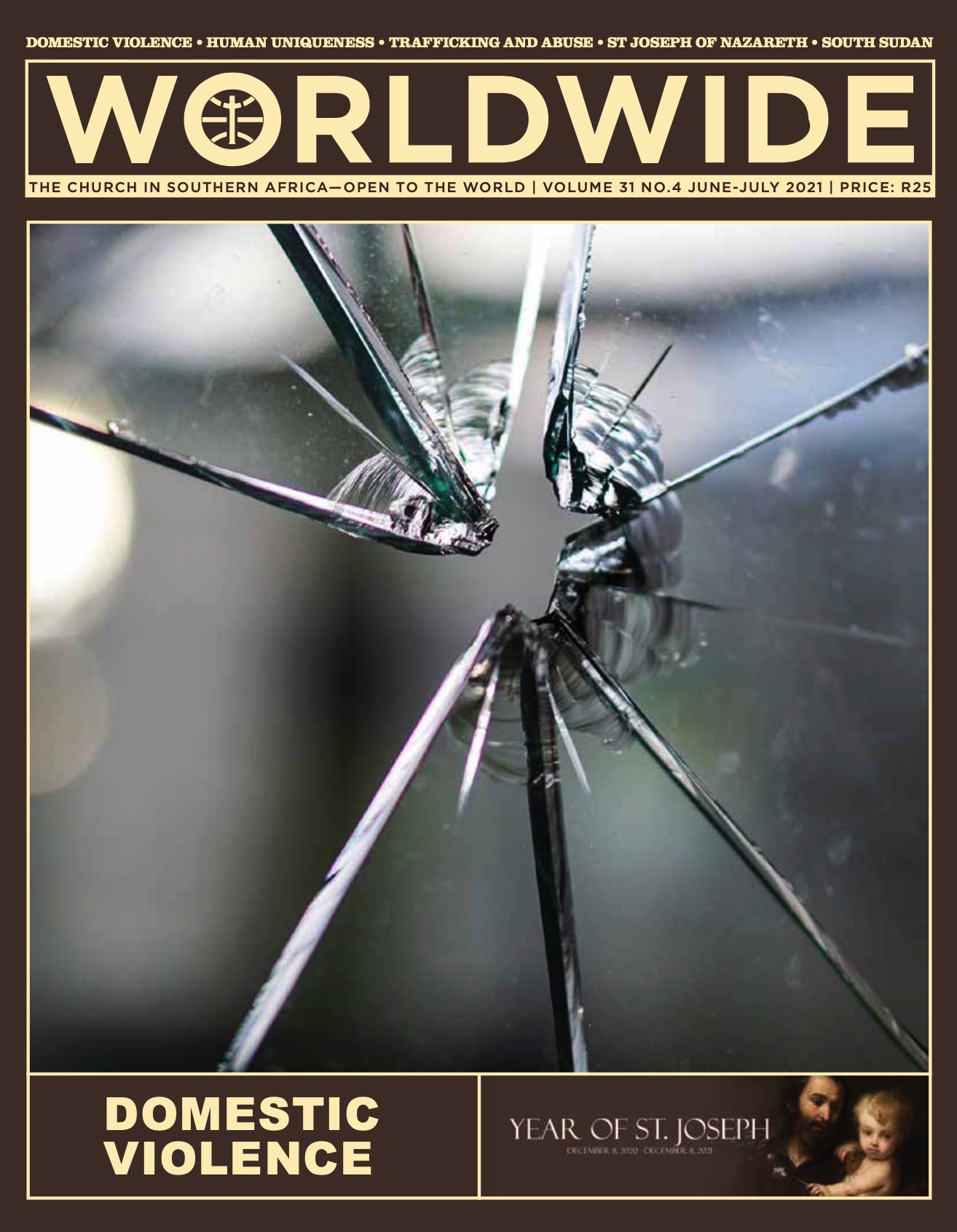
Domestic Violence
The shattered glass represents the broken lives and dreams caused by domestic violence. abuses in families are absolutely contrary to God’s plan of mutual care and fraternity for humanity. domestic violence, inflicted especially upon women and children, is a horrendous scourge. To eradicate it we need to foster the education on values of love, equality, respect and dialogue, in society. The alleviation of poverty, protection of the vulnerable and law enforcement will give the victims the courage to speak out and unveil this atrocious crime.
REFLECTIONS

God of The Abused Victims
BY FABIAN OLIVER | THEOLOGY STUDENT, PRETORIA
MY MOTHER told me:
If you stone the white fledglings [little bird],
God will punish you;
if you hit your friend,
God will punish you.
It was God’s sign
and the commandments of God fitted into my hands like ten more fingers.
Today they tell me:
If you do not love war,
if you do not kill a dove a day,
God will punish you;
if you do not strike the black,
if you do not hate the Amerindian,
God will punish you;
if you give the poor ideas
instead of a kiss,
if you talk to them of justice
instead of charity,
God will punish you,
God will punish you.
Mamma, is that really our God?
Juan Gonzalo Rose (Gutierrez 1988)
BETWEEN GOD AND DOMESTIC VIOLENCE
Reflecting on this quote, I was reminded how certain Christian values or theological principles are deeply imbedded into our lived experience. However, it also became apparent how easy it is to confuse what is truly of God and what is our own destructive social projections of God. In thinking about the scourge of domestic violence in general, and violence against women and children in particular, as Christians, we must ask ourselves if this violence stems from an inherent cultural, social, and theological heresy that sustains violence towards those who are the most vulnerable in our society. The question then becomes, how do we (re)affirm Christian values that denounce all forms of domestic violence, and sustain values of love, freedom, and justice for all? This reflection aims to start this conversation by discussing the social and religious practices that implicitly maintain the status quo of domestic violence. Emphasis will be given to the plight of women. The reflection will end by attempting to harvest positive theological responses found in the person and message of Jesus Christ that focus on love over hatred, equality over superiority, and justice (peace) over violence.

CHILDREN OF A LESSER GOD
Consider the following facts: according to a briefing paper from the United Nations, one in five women throughout the world will become a victim of rape or attempted rape in their lifetime; half of all women worldwide who are victims of homicide are killed by their husbands or intimate partners. As many as 27 million (about 70% are women and girls) men, women and children are victims of human trafficking. In India, it is estimated that around 25 000 to 100 000 women are killed each year over dowry disputes, many of whom are burnt alive as a result (De La Torre 2014). In South Africa, on average, every eight hours a woman dies at the hands of an intimate partner. Intimate partner violence (IPV) is one of the leading causes of death among South African women. Of pregnant women, about 40% experience physical IPV and about 19% experience sexual IPV (Nhlapo 2017).
Local theologians, Tinyiko Maluleke and Sarojini Nadar refer to what they call the “unholy trinity” which are religion, culture, and gender socialization. For them, this “trinity” possesses the power that often perpetuates the toxic treatment of women. Furthermore, they note how religion has very seldomly come to the aid of abused victims. Instead, sacred texts were [are] interpreted and used to justify the violence experienced by the victims (Maluleke & Nadar 2002). When religion is wrongly practised, victims of domestic violence are often told to suffer in silence like Jesus suffered on the Cross. In this instance, victims of domestic abuse may wonder if this is really the God they serve, the God that allows and even supports violence and abuse. They may feel as if they are the children of a lesser God. Thus, when dealing with domestic violence, the Church should start its reflection by looking inwards at its own practices and implicitness of this violence. In doing this, it may rethink some of the ideological identification of women with Eve, and with sexuality and sin which have supported patriarchy. For example, early Church father Tertullian said the following of Eve: “You are the devil’s gateway. You are the unsealer of the forbidden tree. You are the first deserter of Divine Law” (McReynolds & Graff 1995)
JESUS, THE ABUSED VICTIM
It is in Jesus that we see both our fragmented humanity and true humanity overlap. Jesus, whose obedience to God meant going against some social, cultural, and religious practices of the time, demonstrates that resisting dehumanizing ideologies (that include patriarchy, sexism, racism, inequality) paves the way to renewed life beyond oppression. Looking to the crucifixion, some feminist scholars insist that aside from being a saving act, the Cross also demonstrated the act of violence and injustice. Jesus was a victim of a grave injustice; therefore, salvation is when we are freed from violence and capable of living life in abundance (justice), which was the intention of the ministry of Jesus (Brock & Parker 2015). As we see Jesus on the Cross, our eyes are opened, minds renewed, and hearts drawn to this innocent act of love. May we who witness this, condemn all forms of abuse, and go out and express the fullness of love to all brothers and sisters. In his Letter to women at the Beijing Conference in 1995, Pope St John Paul II put it this way

THE GOSPEL AND WOMEN
When it comes to setting women free from every kind of exploitation and domination, the Gospel contains an ever-relevant message which goes back to the attitude of Jesus Christ Himself. Transcending the established norms of His own culture, Jesus treated women with openness, respect, acceptance and tenderness. In this way He honoured the dignity which women have always possessed according to God’s plan and in His love. As we look to Christ at the end of this Second Millennium, it is natural to ask ourselves: how much of His message has been heard and acted upon?
Through the lens of the Scriptures, we encounter a God of the poor, orphan, widow, slave, and abused victim. Consequently, the Church should always stand in solidarity with all who suffer from violence and abuse. Domestic violence strips away from our true humanity, our being made in the image of God. African womanist theologian, Mercy Oduyoye notes that to disrespect (I will add kill, abuse, rape, enslave…) women is to disrespect (kill, rape, abuse, enslave…) God who made us men and women (killing of the relational image). Though sin has taken, sin cannot finally destroy because “as God lives so shall we live” (Oduyoye 2001).
